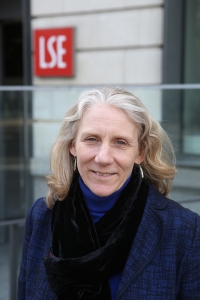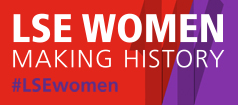 As part of Women’s History Month at LSE, Professor Julia Black – LSE’s Pro-Director for Research and Professor of Law – spoke with Isabella Chan of LSE’s Equity, Diversity and Inclusion (EDI) team about achieving dramatic improvements in gender equality at the School, engendering cultural change, and the importance of inspiring role models.
As part of Women’s History Month at LSE, Professor Julia Black – LSE’s Pro-Director for Research and Professor of Law – spoke with Isabella Chan of LSE’s Equity, Diversity and Inclusion (EDI) team about achieving dramatic improvements in gender equality at the School, engendering cultural change, and the importance of inspiring role models.
Isabella Chan: Right, so, thank you Julia for agreeing to take part in this interview. When looking at LSE as an institution, how would you characterise the school’s record on equality in general and gender equality specifically please?
Julia Black: I think the School has been a bit complacent. I think the School has assumed that because it was out there bettering society, that everything inside was fine, and there were no problems that it needed to get to grips with. And I think there have been a few shocks to that complacency, which have made a number of people in the organisation realise that some of the demands that a number of others within the organisation – women, ethnic minorities, disabled people – have been making for a long time actually now need to be listened to. So I think, oddly, we have the men’s rugby club to thank for an awful lot of work which is currently underway, because I think that really did make the institution go ‘wow – there are things going on here that we actually do need to address and we need to take control of.’ So, the School has been a bit complacent and as a result it’s quite a long way behind the curve – from other institutions and other organisations – in terms of structures, processes, expectations, culture and working practices.
Isabella: So these are, you think, aspects of the School that perhaps strike you as problematic – the culture that has been here quite a long time?
Julia: Yes, I think culture is made up of lots of little things – lots of little ways that people behave, things that happen without anybody really taking a conscious decision. There has never been a conscious decision that we are going to operate in an environment which is not congenial to different minorities, which is not congenial to the promotion of women into senior positions. There has never been any kind of conscious decision. But what we have had is a series of actions, ways of working, cultures, which have led us to be in the situation where we are, as I say, some considerable way behind other organisations, and we are now taking conscious note of how it is we are behaving as an organisation, how it is we are behaving as individuals, and what the implications of some of those behaviours and practices have been.
Isabella: What would you say are the causes for gender-based inequalities within LSE? Are there, perhaps, obvious obstacles that exist? Are there particular features of the School culture that can create difficulties?
Julia: So this is a really difficult question – this is what we are trying to work through at the moment. And we have to think of it both in terms of the academics and in terms of professional services divisions. And we know on both sides of the house, as it were, that, in LSE ‘job speak’, at the band eight level – so that’s around about assistant professorial level, or band eight on the professional services level – that the ratio of men to women flips, on both sides, and gets progressively worse in terms of gender imbalance as you move up the ranks. And, in fact, we are slightly better on the academic side in terms of having senior women in post – I think there are about 25 per cent of our professors who are female, which is not so far out of line with the higher education sector as a whole. Though I think we need to compare ourselves with the social sciences, rather than including all the STEMM [science, technology, engineering, medicine and mathematics] subjects because of the distortions that that introduces. But on the professional services side, we are dreadful, absolutely dreadful. We have one divisional director who is a woman, who is Nicola Wright, the Director of Library Services. We have a cadre of women at the band nine level, which is really strong, but small. We are way out of line with the rest of the higher education sector there. And so I think what we need to do is really understand well, what have we been doing – have we maybe just been sleepwalking? Have we really not taken proper cognisance of some of the difficulties and challenges that there are in place? We’ve been quite slow on introducing clear, very flexible modes of working, which affect professional service staff more than they do academics, because as an academic it is much easier to work flexibly. Academics don’t need to request permission from a line manager to attend a school assembly. But in relation to promotion for both, have we not been mentoring effectively? Not been putting people forward effectively? And I think it comes down to those wholescale structural changes and I think we may well have been an organisation where you respond to the people who shout loudest, and the people who shout loudest don’t tend to be women.
Isabella: Oh right, so that is a particular thing in higher education and everywhere really, culturally, that women don’t shout that loud?
Julia: Women don’t shout that loudly! In fact, it’s slightly off-piste, but I was reading a piece in the FT today about venture capital. Although start-ups run by women are more likely to be successful than those run by men, men are more successful at getting money from equity providers than women, because they go out and they do a ‘big ask’.
Isabella: That’s interesting! As an institution, what are the key challenges for the school in overcoming the barriers to gender equality? Are there particular initiatives and changes that should be implemented?
Julia: Okay, so the barriers are huge, but we have got, finally, a number of initiatives underway. We have the EDI Taskforce, which is very important and has a whole remit of not just gender equality, but all protected characteristics, and not just staff, but including students. So, taking that holistic perspective across the whole of the institution and across all different minorities is absolutely critical – otherwise we just privilege one to the exclusion of everybody else which would not be a very inclusive ‘inclusion’ strategy! So there’s the taskforce and, particularly in the area of gender equality, there is the Athena SWAN charter mark – which, of course, I am the chair of and I lead – and that is something that is quite familiar across the rest of the higher education sector, because it has been required for the STEMM subjects for quite some time now. It’s new to social sciences, arts and humanities, and therefore very new to the LSE. It prompts very mixed responses. For some, it is actually just a tick-box exercise and something that we shouldn’t bother to engage in because it denigrates any actions to trying to improve equality and inclusiveness, because it is seen as an excuse for doing nothing, whilst getting a badge of legitimacy, so you can wave a trophy around and say ‘oh, we’ve got this but we haven’t actually done anything.’ Symbolic compliance, in other words. But to my mind it is an organisational choice, whether or not we have symbolic compliance or we actually have an engine, a lever, for actually producing much more fundamental cultural change. And for me, we could fill in some boxes and we could take some things and we could get somebody fantastic to go and write it like Isabella [Santamaria] that would get us the award, at least bronze, but that’s not the point. It’s not a question of, to paraphrase some colleagues within the LSE, of ‘hitting the target but missing the point’. So for me, Athena is absolutely critical because it is a really important lever to actually get in place different policies, different practices, and thereby – slowly, slowly, slowly – engender some cultural change.
Isabella: And hopefully we will actually be leading the way, as we do in the social sciences… we will be leading the way in gender equality in the future!
Julia: We should lead the way, in everything that we do! We are so focused on leading the way in everything we do in research. We haven’t focused enough on how the whole organisation runs, including our professional services support divisions – so we absolutely have to do that.
Isabella: Thank you – that’s helpful. To ensure that there is continuous improvement over time, how should LSE seek to monitor the impact of equality initiatives and evaluate progress?
Julia: It’s a really important issue – actually quite difficult to do. But there are some quick wins, largely because we’ve done nothing to date! So, you know, there are key KPIs [key performance indicators] – the charter marks, as I say. There are very mixed views around them, but you know, they are an external validation, whether you like them or not and so the Athena SWAN charter mark, the Stonewall Workplace Equality Index, the Race Equality Charter – all of those are externals coming in to have a look at you, holding up a mirror, and saying, well actually this is what we think you look like. So they are necessary and they are part of a validation process. There are other metrics that are key around promotions, obviously, and around pay. But the key metrics I think are around staff satisfaction. The analysis of the staff survey by gender, for example, showed quite wide disparities in terms of levels of work satisfaction. Do I feel that my tasks and skills are being used appropriately? Far more men think that’s true across the School than do women. So, what are we missing? What are we missing here? We’ve got talented people here. We need to use their talents fully – everywhere. So why are we not doing that? So a lot of it is going to be a lot of drilling down, but we do have some good metrics and some good benchmarks that we can start to use, and then we just need to develop more sophisticated ones as we start doing that analysis of all our different policies and practices.
Isabella: And also I suppose with achieving the charter marks – having these action plans in place and then reporting on achieving the action plans – would be a way of monitoring and evaluating progress?
Julia: Absolutely, and we should seek to improve on all of those. Okay, so when we go back to the ECU for revalidation of our Athena SWAN award, assuming we get bronze, we want to be going up to silver, and once we achieve silver then we need to aim for gold. And similarly with all of these different things. There has to be a culture of continuous improvement.
Isabella: Thank you. What is your view on the importance of inspiring role models across various positions at LSE for women at the school?
Julia: Ah, it’s critical. It’s absolutely critical because you, if you have senior women in place, or you have people from ethnic minorities in place, or disabled – heavens above (we really do very badly on that) – people in decision-making capacities and senior positions, then other people can go ‘well, I can do that. She’s done that, he’s done that, they’ve done that, I could do that. There is no reason why I can’t.’ And we know that modelling behaviour is the way that you get behaviours to change. It is not do what I say; it is do what I do – and so having those role models is absolutely vital.
Isabella: And I suppose the school is investing in preparing role models to be visible?
Julia: We are starting, we are starting! Taking our baby steps! The leadership programme – which was introduced a few years ago – I think is a really important vehicle. It’s not, again, none of these things is a quick fix, but increasing the content and awareness around unconscious bias, around EDI issues specifically in specific modules, I think is a very good way of introducing a kind of awareness – and that runs across professional service divisions and academics. To my mind, the leadership programme should be rolled out across all heads of department. Every HOD should have to go on that leadership programme, and they should have to include those kinds of modules addressing EDI issues. We’ve also got different things, other training, external training, that we are making available to people – the Aurora training programme for women, there are the different training programs run by Stonewall, there are initiatives for LGBT+ leadership, for race equality, for ethnic minority leadership. Now there is always an issue about whether you should have segmented training or whether you should mainstream. At the moment we should just do both, because we should just do as much as we can to try to foster an EDI culture and set of practices, and to enable us to get through that glass ceiling that is there at the band 8, as I mentioned before – across the whole School. You know, which is down to a bunch of different factors but we’ve got to start breaking that and making people aware of the fact that women, in this case, can be leaders, and make women aware themselves that they can be leaders.
Isabella: And having role models that would illustrate this…
Julia: … having role models and mentors. We don’t have a very sophisticated mentoring scheme at the moment, and I think that will be a key elements of just saying to people, ‘you can do this’. But also helping people get through different stages in their lives – particularly if you’ve got caring responsibilities for young children, or elderly parents, then recognising that people’s pace of work is going to change as they go through those periods, but to enable them to pick back up again as their lives move on and circumstances change.
Isabella: Lovely, thank you – that’s really helpful. That’s really quite inspiring to see the institution working in such a positive way. Given your experience as a successful academic and professor at LSE, are there any tips for success that you could share with others?
Julia: That’s always really difficult, isn’t it?! Because it always sounds a bit smug! Well, I don’t sleep a lot! I manage to fit quite a lot in. It’s very difficult to do this without sounding, as I say, quite smug. One, get the right partner – get yourself a partner who is going to help out with the childcare, with all the housework, all the household chores and see it as an equal partnership. And I think the second thing is to recognise that, you know, that it is not a linear progression. Having a career is not a linear progression – you don’t move at the same speed, at the same rate at different times. So I backed off for five years while I had my two children, so I was part-time for most of that time, and when I was at 0.4FTE I was down to 16 hours childcare week, and all my work just had to be done in those 16 hours and the rest in the nooks and crannies of the rest of the day – mostly very early mornings and very late evenings. But that was just a conscious decision I took. But then the balance shifts, so, be flexible, get the right partner, and just keep going, just keep going – don’t be knocked back and don’t let anybody else knock you back!
Isabella: And if there will be times where you need mentors or you need support, then ask for mentors or for support, or go to your line manager and explain your need to move forward with your career? I suppose, specifically now the School is looking to implement a very effective mentoring scheme, this would be a way of supporting women, or supporting everybody, who would want really to move forward in their academic career, or in their career within LSE?
Julia: Absolutely. Absolutely and formalising that and both parties understanding what the mentoring relationship is for and making sure that it is quite separate from the formal career development process. But, having mentors formal and informal is always critical, isn’t it? We always need that.
Isabella: Thank you very much for your thoughtful answers and thanks for giving us the time to interview you!
Julia: It was a pleasure!
Find out more about LSE Women: making history #LSEwomen






